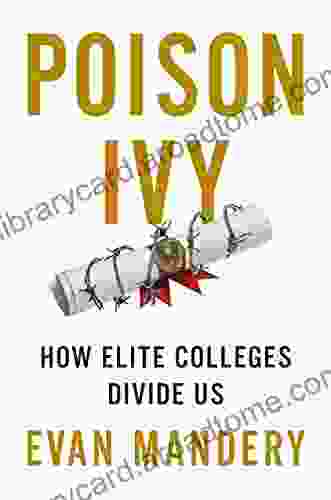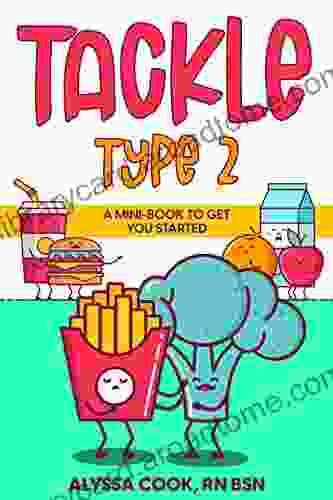Poison Ivy: How Elite Colleges Divide Us

The Ivy League has long been seen as the pinnacle of higher education, but a new book argues that these elite institutions are actually ng more harm than good.
In "Poison Ivy: How Elite Colleges Divide Us," author Richard Reeves argues that the Ivy League's focus on prestige and exclusivity is creating a class divide in America. He also argues that the Ivy League's admissions process is biased against students from poor and minority backgrounds.
5 out of 5
| Language | : | English |
| File size | : | 1047 KB |
| Text-to-Speech | : | Enabled |
| Print length | : | 189 pages |
| Screen Reader | : | Supported |
Reeves's book is a timely and important contribution to the debate over the role of elite colleges in American society.
The Class Divide
Reeves argues that the Ivy League's focus on prestige and exclusivity is creating a class divide in America. He points to the fact that the Ivy League schools have a very small number of students from poor and minority backgrounds.
For example, at Harvard University, only 15% of the students come from families with incomes below $60,000. And at Yale University, only 12% of the students are black or Hispanic.
This lack of diversity means that Ivy League graduates are not representative of the American population. Instead, they are a small, privileged group who have access to the best jobs and opportunities.
This class divide is not only unfair, it is also harmful to society as a whole. It creates a sense of entitlement and elitism among the Ivy League graduates, and it makes it difficult for people from poor and minority backgrounds to succeed.
The Admissions Process
Reeves also argues that the Ivy League's admissions process is biased against students from poor and minority backgrounds.
He points to the fact that the Ivy League schools rely heavily on standardized test scores, which are known to be biased against students from poor and minority backgrounds.
For example, a study by the College Board found that black students who scored in the top 10% on the SAT were less likely to be admitted to an Ivy League school than white students who scored in the bottom 10%.
This bias in the admissions process means that the Ivy League schools are not admitting the best and brightest students from all backgrounds. Instead, they are admitting the students who are most likely to come from wealthy families and who have access to the best educational resources.
The Way Forward
Reeves argues that the Ivy League needs to do more to address the class divide and the bias in its admissions process.
He suggests several reforms that the Ivy League could adopt, including:
- Increasing the number of students from poor and minority backgrounds
- Eliminating the use of standardized test scores in the admissions process
- Providing more financial aid to students from poor and minority backgrounds
These reforms would help to make the Ivy League more accessible to students from all backgrounds, and they would help to create a more just and equitable society.
Reeves's book is a powerful indictment of the Ivy League. He argues that these elite institutions are ng more harm than good, and he calls for a number of reforms to address the class divide and the bias in the admissions process.
Reeves's book is a must-read for anyone who is concerned about the future of higher education in America.
5 out of 5
| Language | : | English |
| File size | : | 1047 KB |
| Text-to-Speech | : | Enabled |
| Print length | : | 189 pages |
| Screen Reader | : | Supported |
Do you want to contribute by writing guest posts on this blog?
Please contact us and send us a resume of previous articles that you have written.
 Book
Book Novel
Novel Page
Page Chapter
Chapter Text
Text Story
Story Genre
Genre Reader
Reader Library
Library Paperback
Paperback E-book
E-book Magazine
Magazine Newspaper
Newspaper Paragraph
Paragraph Sentence
Sentence Bookmark
Bookmark Shelf
Shelf Glossary
Glossary Bibliography
Bibliography Foreword
Foreword Preface
Preface Synopsis
Synopsis Annotation
Annotation Footnote
Footnote Manuscript
Manuscript Scroll
Scroll Codex
Codex Tome
Tome Bestseller
Bestseller Classics
Classics Library card
Library card Narrative
Narrative Biography
Biography Autobiography
Autobiography Memoir
Memoir Reference
Reference Encyclopedia
Encyclopedia Ann Silvers
Ann Silvers Alexandra Pope
Alexandra Pope Mark Davenport
Mark Davenport Winifred Phillips
Winifred Phillips Alison Ragsdale
Alison Ragsdale Malcolm Collins
Malcolm Collins Alex Abramovici
Alex Abramovici Andrew Higson
Andrew Higson Alan Johnstone
Alan Johnstone Althea Helinde
Althea Helinde Long Qing Chen
Long Qing Chen Prince Babatunde Orishagbemi
Prince Babatunde Orishagbemi Glenn P Hastedt
Glenn P Hastedt Alan Royle
Alan Royle Alan Brinkley
Alan Brinkley Amanda Green
Amanda Green Berel Lang
Berel Lang Linda Mizejewski
Linda Mizejewski Alison J Black
Alison J Black Ann Marie Stephens
Ann Marie Stephens
Light bulbAdvertise smarter! Our strategic ad space ensures maximum exposure. Reserve your spot today!

 Darren Blair120 Practical Java Programming Practices and Projects: A Comprehensive Guide...
Darren Blair120 Practical Java Programming Practices and Projects: A Comprehensive Guide... Jace MitchellFollow ·3.1k
Jace MitchellFollow ·3.1k Ernest HemingwayFollow ·16.3k
Ernest HemingwayFollow ·16.3k Nathaniel HawthorneFollow ·6.3k
Nathaniel HawthorneFollow ·6.3k Arthur MasonFollow ·7.9k
Arthur MasonFollow ·7.9k Thomas HardyFollow ·13.7k
Thomas HardyFollow ·13.7k Bo CoxFollow ·9.8k
Bo CoxFollow ·9.8k Willie BlairFollow ·11.4k
Willie BlairFollow ·11.4k Eugene PowellFollow ·11.5k
Eugene PowellFollow ·11.5k
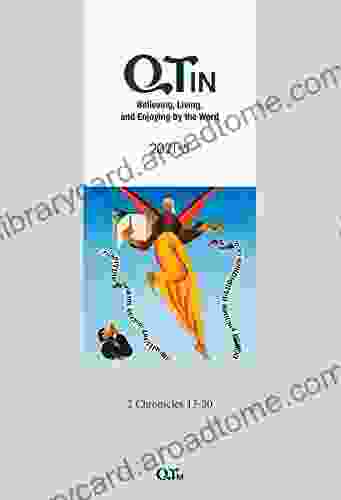
 Joshua Reed
Joshua ReedBelieving, Living, and Enjoying by the Word: Unlock the...
In a world filled with...
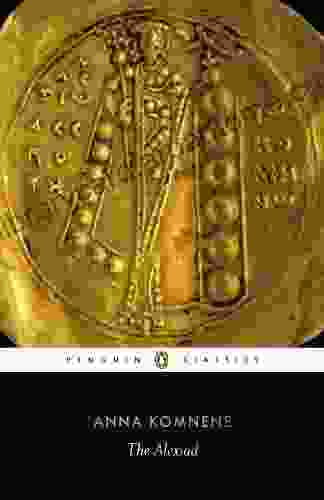
 Cason Cox
Cason CoxUnveil the Extraordinary World of "The Alexiad": A...
Delve into the Heart of Byzantine...

 Junot Díaz
Junot DíazUnveiling the Intricacies of Intellectual Property: Your...
In today's knowledge-driven economy,...
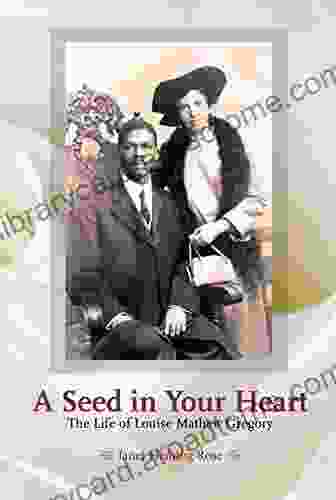
 Aleksandr Pushkin
Aleksandr PushkinThe Life of Louise Mathew Gregory: A Tapestry of Triumphs...
A Woman of Extraordinary Substance Louise...

 Leon Foster
Leon FosterHomemade Lotion For Beginners: Transform Your Skincare...
Step into the world of...
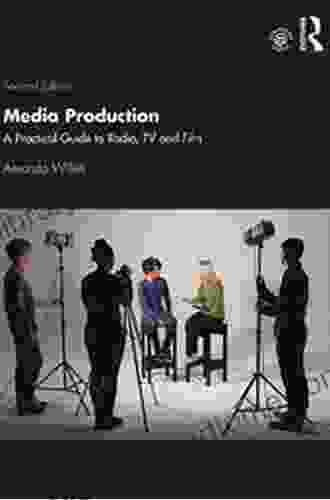
 Terence Nelson
Terence NelsonUnveiling the Secrets of Radio, Television, and Film: An...
: Embarking on a Journey into the...
5 out of 5
| Language | : | English |
| File size | : | 1047 KB |
| Text-to-Speech | : | Enabled |
| Print length | : | 189 pages |
| Screen Reader | : | Supported |


